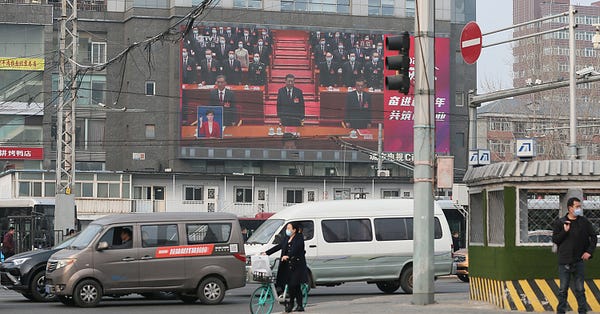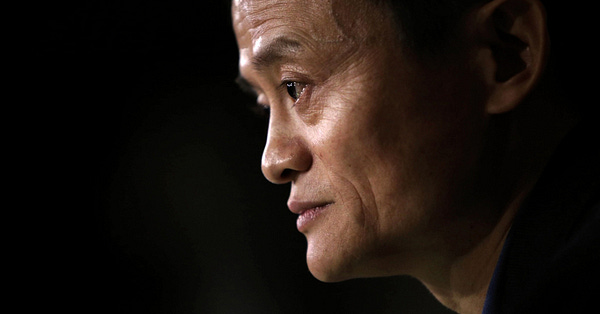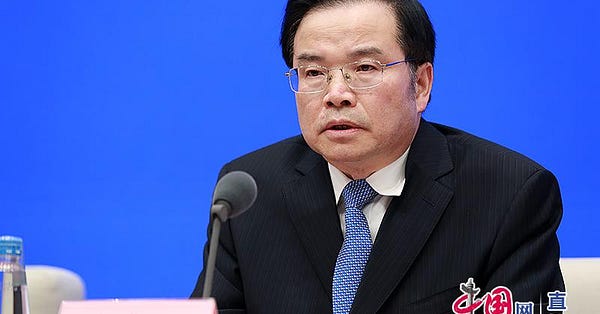Welcome to the 64th edition of Trade War. China reports 18.3 percent first quarter GDP growth but the headline number obscures a weaker economy. In a demonstration of how politics is intruding further into business, Beijing may force Jack Ma to divest his share in Ant Group.
Hong Kong continues its crackdown on democratic rights, sentencing some of the best known of its older generation of activists to prison. And the Biden administration sends a group of retired U.S. officials to Taiwan as part of efforts to further strengthen unofficial ties with the self-governing island.
Finally, it looks like a decision on the next U.S. ambassador is imminent, while I examine the perennial question of just how popular the Chinese Communist Party is.
18.3% growth and a historically sluggish pace
China reported a whopping 18.3 percent growth in the first quarter, as compared to the same period a year earlier, during the height of its pandemic-influenced slowdown. Don’t break out the champagne yet, however; the more revealing number is the sluggish 0.6 percent growth over the previous quarter, reports the Wall Street Journal’s Jonathan Cheng.
“Signs of waning momentum are starting to appear. That latest quarter-on-quarter GDP figure marks the slowest growth rate in the past decade, with the exception of the coronavirus-hit first quarter of 2020,” Capital Economics’ Julian Evans-Pritchard told the Journal, citing the weakening industrial, construction and services sectors.
“The domestic economic recovery is not yet solid,” said National Bureau of Statistics spokeswoman Liu Aihua. She pointed to weak employment numbers including 2.5 million fewer migrant workers traveling to cities in the first three months of the year, as compared to pre-pandemic numbers, as the service sector and small enterprises struggle, as well as a 13.6 percent jobless rate for workers from 16 to 24 years-old, up 0.3 percentage points, year-over-year.


Jack Ma forced to divest Ant Group share to state?
“Ant Group is exploring options for founder Jack Ma to divest his stake in the financial technology giant,” reports Reuters, citing sources familiar with China’s regulators and with close ties to the company.
One option is selling Ma’s stake, worth billions of dollars, to existing investors in Ant or parent company Alibaba, which is the company’s preferred option. That may not be possible, however, the news service reports.
One source told Reuters that “Ma was told that he would not be allowed to sell his stake to any entity or individual close to him, and would instead have to exit completely,” with one possibility seeing Ma “transfer his stake to a Chinese investor affiliated with the state.”
According to another source there is "a big chance" Ma would sell his equity interest which is held through investment vehicle Hangzhou Yunbo. That would “[pave] the way for the fintech major to move closer to completing its revamp and reviving its listing,” reports Reuters.


Prison terms for Hong Kong labor leader, media mogul, & ‘father of democracy’
A court in Hong Kong has sentenced some of the territories most well-known, older generation of democratic activists to prison terms of up to 18 months, for participating in a 2019 peaceful protest, reports the New York Times.
Those sentenced include former legislator and labor leader Lee Cheuk-yan, two prominent lawyers, Albert Ho and Margaret Ng, media mogul Jimmy Lai and 83-year-old lawyer Martin Lee, often referred to as the “father of democracy,” who was given an eleven-month-suspended sentence.
“The sentences fell short of the maximum of five years in prison the defendants had faced. Still, they sent an unmistakable message that activism carries severe risks for even the most internationally prominent opposition figures,” reports the Times.
“The penalties meted out now allow Beijing to cast them as criminals, bolstering its defiance of foreign criticism and the sanctions that the United States imposed after the crackdown on Hong Kong.”

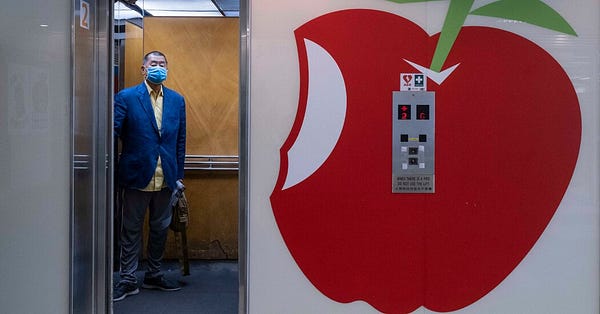
Taiwan gets a lot of ‘unofficial love’ from America
As China continues to threaten Taiwan by flying military planes into its air defense identification zone, president Biden has sent an unofficial delegation to the island including former senator Chris Dodd and former state department officials Richard Armitage and James Steinberg, reports CNN.
“The selection of these three individuals – senior statesmen who are longtime friends of Taiwan and personally close with President Biden – sends an important signal about the US commitment to Taiwan and its democracy,” the officials said.
“Between last week's announcement of new guidelines for US government interactions with Taiwan that reflect the ‘deepening unofficial relationship’ and this ‘unofficial’ delegation reportedly sent as a personal signal from Biden, Taiwan is getting a tremendous amount of unofficial love,” tweeted Maggie Lewis, a Taiwan expert at Seton Hall University’s law school.


A “wow-wow” person for US ambassador to China
Career diplomat Nicholas Burns is the likely next U.S. Ambassador to China indicating Biden’s “preference for a seasoned diplomat instead of a high-wattage politician,” reports Axios.
His appointment would stand in contrast to recent practice with “the last four U.S. ambassadors to China [having] all had experience in retail politics, winning elections statewide, either as a governor or senator.”
“[Biden] needs to appoint a ‘wow-wow’ person to show the world the importance of this relationship,” former Obama-appointed ambassador to China and Montana senator Max Baucus told Axios. “It’s also critical that the person is empowered to negotiate on the president’s behalf,” Baucus said. “The ambassadors should not just be a person to deliver messages.”
Burns is a Harvard University professor who served as spokesman to the State Department as well as undersecretary of state for political affairs for President George W. Bush.
Just how popular is the Chinese Communist Party?
I look at the big question of how much support does the Chinese Communist Party have in China, and what are some of the sources of its legitimacy, in this blog published by the Atlantic Council.
“To watch the news broadcast inside China is to see the United States in chaos: police brutality against African Americans, the January 6th storming of the US Capitol, and people freezing to death during the Texas power shortages,” I write.
“The onslaught of negative news about the United States is part of an effort to make the Chinese Communist Party (CCP) look capable in contrast to a floundering US administration, thereby convincing the Chinese people that they should be pleased with their current leadership.”
“The precarious balancing act that China’s leaders have struck—one that mixes strident nationalism and policies that push overheated economic growth with overwrought propaganda—will continue to present them with daunting challenges,” I conclude.
_____________________________________________________________
Frustrated with the swagger of tech billionaires
“President Xi Jinping’s government has steadily trotted out policies seemingly designed to rein in the country’s most powerful corporations and their billionaire founders,” reports Bloomberg News.
Following the crackdown on Alibaba and subsidiary Ant Group, “Tencent may become the next target, with regulators said to be considering requiring the social media giant to establish a financial holding company to contain its banking, insurance and payments services.”
Why the assault on tech companies now? Some think China’s leaders “may have grown frustrated with the swagger of tech billionaires and want to teach them a lesson by breaking up their companies -- even if it means short-term pain for the economy and markets.”
The rise and fall of Jack Ma
The Financial Times has written the definitive look thus far at the rise and fall of Alibaba’s Jack Ma.
Another Jack sighting - this time with Putin
Jack Ma Ma has made another fleeting appearance, this time showing up at a videoconference meeting of the Russian Geographical Society with Russian President Vladimir Putin, reports Insider. Ma is on the group’s board of trustees and did not not speak at the event.


It’s a tough time to be wealthy in China
Just last year ByteDance, owner of global video-sharing app sensation TikTok, was under attack with the Trump administration pushing it to divest assets and India banning some of its social media apps. That didn’t stop it from keeping growing, however, and now its founder 38-year-old Zhang Yiming has become one of the world’s richest people, reports Bloomberg News.
“Zhang, who owns about a quarter of ByteDance, could be worth more than $60 billion, placing him alongside Tencent Holdings Ltd.’s Pony Ma, bottled-water king Zhong Shanshan and members of the Walton and Koch families in the U.S., according to the Bloomberg Billionaires Index,” writes Bloomberg’s Zheping Huang.
“It’s a tough time to be wealthy in China as the government seeks to rein in the country’s most powerful corporations and their billionaire founders,” notes the Bloomberg article, adding that “while ByteDance hasn’t been singled out as a target, its dominance in social media and war chest for deal-making are sensitive areas the government is looking into.”

Appropriately regulate excessively high incomes
Following the completion of Xi’s campaign to eliminate absolute poverty, China’s leaders increasingly are focussing on combatting inequality; that could be bad news for China’s richest, writes Andrew Batson, China research director at consultancy GavekalDragonomics, in his blog.
A finance official recently spoke of the need to establish “personal income and property information systems,” and to “appropriately regulate excessively high incomes, outlaw illegal income, and curb income obtained through monopoly and unfair competition,” Batson points out.
“The finance ministry does sound as if it is getting ready to toughen enforcement of China’s rather lax personal income tax system, and bring many of the high-income individuals that now successfully evade taxes into the tax collection net,” Batson writes, adding that “the new era of common prosperity [likely] will be one of tougher legal and political scrutiny of high-income and high-net-worth individuals.”
_____________________________________________________________
Notable/In Depth
"I came to Beijing in my early 20s. I devoted all my youth to this city. After so many years, the city has paid me next to nothing in return," says a migrant working as a delivery courier, in this moving interview by Huang Chenkuang.


In February a labor organizer and delivery worker named Mengzhu disappeared into detention and police have warned friends and family from trying to help him, reports NPR’s Emily Feng in this revealing piece.


“Maneuvering over the next Dalai Lama has already begun, with India and the U.S. countering China’s attempts, which the current Dalai Lama opposes, to control the process,” reports Bloomberg News.

China’s maritime militia, a gray zone force sometimes called “Little Blue Men” for the color of their vessels, could include thousands of ships and tens of thousands of personnel, estimates Andrew Erickson, a professor of strategy at the Naval War College. Read more in this CNN report.


“The world’s solar power surge depends on polysilicon from Xinjiang factories. Embrace the green future, and you have no way of knowing if you're purchasing products made by forced labor and dirty coal,” tweets Bloomberg News editor Jeff Black, referencing this report.

“China’s broader technology aims can be broken down into three buckets: self-reliance, fundamental breakthroughs, and economic upgrading,” explains Matt Sheehan in this piece for MacroPolo.

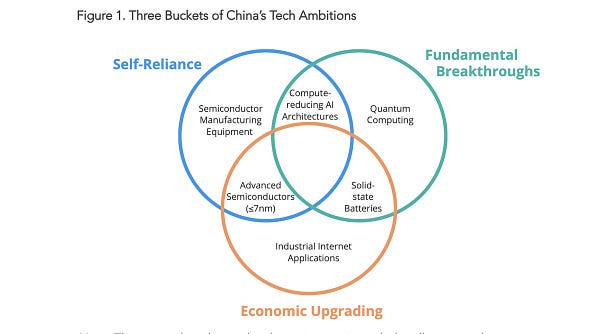
Upcoming book talk
I will be speaking about my book The Myth of Chinese Capitalism next Thursday evening (U.S. time; Friday morning India time), via the Chennai Centre for China Studies.


And some book news
I am pleased to see this nice shoutout from Apple Daily for 《低端中國》the Chinese edition of my book. Also, there is a video inside the link (Cantonese).




